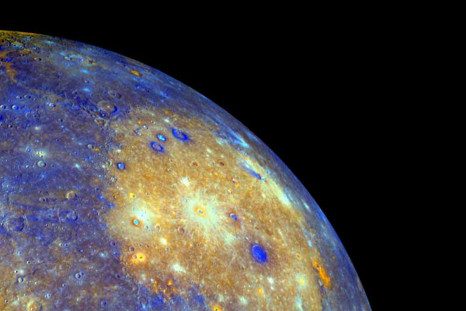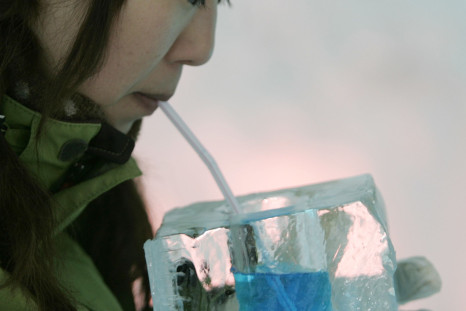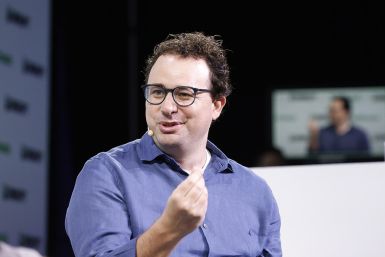More From Ritwik Roy
Mercury's surface formed when volcanic activity spewed up materials from the core
Lab experiments have revealed that the chemistry of Mercury’s most ancient plains was likely forged near the planet’s core. NASA researchers said that Mercury’s surface feature originated from intense heating and crushing of rock 400 kilometres down, where the planet’s mantle meets the iron core.
Jun 30, 2016
Human hand in hobbit extinction? Indonesia's fireplace discovery suggests so
Mounting evidence suggests that ancestors of modern humans were responsible for the extinction for the only known population of hobbits. The hobbits, around 104 centimetres tall, were using stone tools about 50,000 years ago.
Jun 30, 2016
Australian company gets cannabis nod, secures Canadian licence to grow marijuana
MMJ PhytoTech Limited has secured medicinal cannabis production licence in Canada. It’s the first Australian-based company to receive a Canadian medical cannabis cultivation licence.
Jun 30, 2016
Whale sharks of Indonesia: Incredible ‘road trips’ to faraway destinations still a mystery [VIDEO]
Tracking devices on whale sharks in Indonesia have revealed incredible mysteries about the gentle giant fish. One of the interesting finds is that whale sharks take amazing “road trips” to faraway destinations and the reason is unknown to experts.
Jun 30, 2016
‘Game of Thrones’ Season 7 spoilers: Jon Snow and Sansa Stark rift may widen because of Littlefinger
Sophie Turner, who plays the character of Sansa Stark in HBO’s “Game of Thrones,” has revealed that Sansa is jealous of Jon Snow (Kit Harington) even though she loves him a lot.
Jun 29, 2016
Sun has gone totally spotless and that's bad news for Earth
Climate experts have predicted that the Earth may be heading towards a mini Ice Age as the face of the sun has “gone blank.” Experts analysed the solar surface that is currently exhibiting a distinct lack of action. If this happens, it might be similar to the “Game of Thrones” catchphrase: “Winter is Coming.”
Jun 29, 2016
Huge helium discovery in Tanzania an immense relief amidst world shortage and dwindling reserves
A Norway-based exploration company, working with Durham and Oxford universities, has discovered vast reserves of the rare vital gas helium in Tanzania. The scientists believe that this massive reserve of the rare gas may rescue the world from a shortage.
Jun 29, 2016
Medieval weapons foundry discovered near Lake Baikal; ‘Unique’ ancient furnaces point at advanced technology
Archaeologists have discovered a medieval forge that dates back to about A.D. 1000 near Lake Baikal in Russia. Remote sensing at the spot revealed the presence of two underground structures that were stone furnaces for making weapons.
Jun 29, 2016
Astronomers baffled by ‘stealth black hole’ discovery; Potent radio waves may represent new black hole population
Astronomers have found out that a mysterious source of radio waves thought to be from a different galaxy is actually a binary star system containing a black hole and a low mass star. The discovery suggests that a huge number of black holes in our Galaxy Milky Way have gone unnoticed.
Jun 29, 2016
Rare meteorite on Earth points towards Mercury's origins
MIT geologists have studied part of planet Mercury’s cooling history right after it formed between 4.2-3.7 billion years ago and traced its origins to an enstatite chondrite, a rare meteorite. This kind of meteorite is extremely rare on Earth.
Jun 29, 2016
Praying mantis cannibalism allows males to assign more of their biological material in female mantis’ eggs
Scientists have found that female mantises who eat their male sex partner after sex produce more eggs than those who do not. Sexual cannibalism in mantises allows the male to assign more of their biological material in female mantis’ eggs in order to make her more fertile.
Jun 29, 2016
Researchers develop model to understand what makes some people nasty and some nice
UK researchers have developed a mathematical model that looks at what makes people nasty or nice. Moreover, the model also looks at the fact why both the types can exist together.
Jun 29, 2016
Bread with folic acid reduces birth defects in Australian babies
An Australian Institute of Health and Welfare (AIHW) report has revealed that the 2009 mandate by Federal Government to add folic acid and iodine to all breads except organic breads is a major success. The drastic step has successfully battled two major health issues, severe birth defects (spina bifida) caused by a lack of folic acid and re-emergence of iodine deficiency.
Jun 29, 2016
Australian study on mice reveals stress can cause cancer to spread faster through the body
The body’s lymphatic system may allow breast cancer cells to spread faster if a sufferer is stressed. New Australian research has shown chronic stress accelerates the spread of cancer in mice.
Jun 29, 2016
Kit Harington’s black eye landed him Jon Snow’s role in ‘Game of Thrones’
Kit Harington, who plays the insanely beloved “Game of Thrones” character Jon Snow, got into an altercation with a customer at a McDonald’s restaurant, the night before he auditioned for the hit HBO series. He auditioned with a black eye all because of the fight but was selected.
Jun 28, 2016
Scientists creating perfume that will smell like comet 67P/Churyumov–Gerasimenko
British researchers have developed a perfume that smells like a comet, particularly the 67P/Churyumov–Gerasimenko, on which the European Space Agency (ESA) touched down in 2014.
Jun 28, 2016
Gravitational waves in space may reveal how supermassive black holes formed
Scientists led by Durham University's Institute for Computational Cosmology captured gravitational waves via space-based detectors, and now they believe that these waves can help identify the origins of supermassive black holes. The scientist ran massive cosmological simulations that may be used to predict the rate at which gravitational waves caused by collisions between the monster black holes might be detected.
Jun 28, 2016
Expert claims to have discovered humans’ ability to detect Earth’s magnetic field
A scientist in the US, Joe Kirschvink from the California Institute of Technology, believes that he has finally found evidence of humanity’s sixth sense. He claims that humans have the ability to detect Earth’s magnetic field in a subconscious way.
Jun 28, 2016
Antarctic meteorite contains opal, provides clues about formation of life on Earth
Scientists have discovered pieces of opal in a meteorite in Antarctica. The findings are extremely important for related studies on water and its life-forming abilities. According to a team of British researchers, the opal-studded meteorite is offering new clues as to the origins of life on Earth.
Jun 28, 2016
Southeast Asia's 'Deep Skull' resembles ancestors of Indigenous Borneans and not Australians
New research on an ancient “Deep Skull” discovered in Southeast Asia has revealed the remains had no links to Indigenous Australians as initially thought. Moreover, the skull was that of an older woman and not a teenage boy.
Jun 28, 2016
Parkinson’s disease: 2 genes that are key regulators of immune system discovered
Dr. Michel Desjardins from the University of Montreal and Dr. Heidi McBride from the Montreal Neurological Institute and Hospital (MNI) at McGill University led a team of scientists who discovered two genes associated with Parkinson’s disease. The genes are key regulators of the immune system.
Jun 27, 2016
Bio-inspired surface ensures sticky liquids do not go to waste
Scientists from The Ohio State University have been able to squeeze the last drop of shampoo out of a bottle, thanks to a bio-inspired surface they created. The surface ensures that sticky liquids such as detergent and shampoo slide cleanly out of their bottles.
Jun 27, 2016
14,000-year-old mammoth remains uncovered in Mexico; Mammal could have been cut for meat and pelt
While installing drains near the village of Tultepec, Mexico, workers accidentally uncovered the remains of a Pleistocene-era mammoth in December 2015. Now, experts are completing work on digging up the fossilised bones of the mammoth.
Jun 27, 2016
Bill Cunningham, New York City’s legendary street fashion photographer, dies
Bill Cunningham, the legendary New York Times fashion photographer, has breathed his last at the age of 87. He was hospitalised recently after having a stroke. He was credited for creating the genre of street fashion photography and worked with The Times for nearly 40 years. His watchful eye brought images of New York City to the public.
Jun 26, 2016
China's capital Beijing sinking due to excessive pumping of groundwater, descending by 11 centimetres annually
A team of scientists used cutting-edge satellite imagery to find out that the Chinese capital of Beijing is slowly sinking. Parts of Beijing’s central business district are descending by 11 centimetres annually. Researchers believe that excessive pumping of groundwater underneath the city is the main reason behind the slow collapse of the city.
Jun 26, 2016
Dutch researchers raise peas, radishes, tomatoes and rye on simulated Martian soil
Researchers from Wageningen University in the Netherlands have revealed that cereals and vegetables they grew in “Martian” soil for two years are safe for human consumption. The Dutch researchers successfully raised peas, radishes, tomatoes and rye in soil that was made to match that of the red planet. This has provided researchers the hope of growing food on Mars. The food grown was found to contain “no dangerous levels” of heavy metals.
Jun 26, 2016
Magic straw: Scientists create self-folding, liquid-propelling straw from new material
Canberra scientists have developed a self-pumping straw that can propel liquid with a new material that fold into a tube when water touches it. Researchers from Australian National University have created a new paper-like material that responds to even a tiny droplet of water by folding into a tube several centimetres long. The material self-assembles itself into a tube-like straw and once assembled, the capillary delivers fluids.
Jun 26, 2016
Cancer breakthrough: New study reveals cancer’s unusual survival mechanism, may help in developing effective cancer treatments
Scientists from Queen Mary University of London have made a breakthrough in understanding how cancer cells spread around the body and form tumours. The study says that a cancer cell’s ability to survive as it spreads may well be the weapon to fight the disease. As per the scientists, cancerous cells depend on an unusual survival mechanism to spread around the body. Thus, how cancer spreads and survives could well be the key to curing it.
Jun 26, 2016
Breast cancer, 'bad bacteria,' and NASA technology
Researchers at NASA’s Jet Propulsion Laboratory (JPL) applied NASA technology in a breast cancer study on microbes. This has set the stage to further analyse the role of microbes in causing or preventing breast cancer. Researchers from Western University in Ontario also found a link between breast cancer and “bad” bacteria.
Jun 25, 2016
Climate change puts New Yorkers at risk of extreme heat events; Deaths in thousands predicted by 2080
A new study has predicted that climate change will put New Yorkers at the risk of overheating. The study has predicted thousands of heat deaths by 2080. If no steps are taken to reduce emissions and adapt to warming, as many as 3,331 people may die every year in New York alone by 2080. By that time, the number of hot days is going to triple, and that would cause heat deaths due to respiratory conditions, heart problems, dehydration and heat exhaustion.
Jun 24, 2016
Pages
- PREV
- 35
- 36
- 37
- 38
- 39
- 40
- 41
- 42
- 43
- NEXT


































